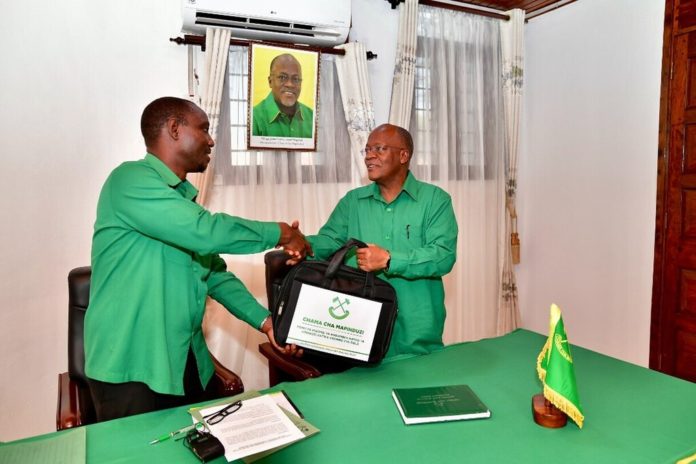Dar es Salaam, June 17 — Despite a looming threat of the Coronavirus pandemic in East Africa, Tanzania President, John Magufuli has ordered reopening of all schools across the country at the end of June.
In his speech to dissolve the parliament, in the capital city Dodoma, ahead of the October 25th general election, President Magufuli said the trend shows Coronavirus outbreak is drastically declining.
“Because the trend shows Coronavirus is rapidly declining, I would like to announce that effectively Monday, 29th June, all schools should be opened, however, Tanzanians should continue to take precaution,” he said.
President Magufuli, who has today officially launched his re-election bid when he collected his nomination forms, has also authorized social activities such as weddings to continue unabated.
The announcement comes barely a day after the Prime Minister, Kassim Majaliwa, told the parliament on Monday, there are 66 coronavirus patients currently hospitalized in 10 regions across Tanzania. He did not elaborate on whether or not those are new cases.
Tanzania stopped publishing Coronavirus statistics on April 29, after the president suspected defective test kits that provided wrong “positive” results.
Amid cheers from a legion of legislators from his ruling Chama Cha Mapinduzi party, President Magufuli said there’s no need to keep schools closed while Coronavirus cases have drastically dropped.
Tanzania has become the first country in the East African region to allow students back to school, weeks after the president ordered reopening of universities and other higher learning institutions.
The East African country confirmed 509 COVID-19 cases, with 21 deaths, 183 recoveries, and 305 active cases when it halted its daily tally on 29 April 2020.
Speaking during an occasion with teachers recently, President Magufuli declared victory against the disease, saying the Coronavirus has been eliminated, thanks to God.
“I want to thank Tanzanians of all faiths. We have been praying and fasting for God to save us from the pandemic that has afflicted our country and the world. But God has answered us,” he recently said in a chapel amid thunderous applause and ululations from the congregants.
The World Health Organisation (WHO), however, expressed deep concern on the manner in which Tanzania handled the Coronavirus pandemic.
Critics said the country’s refusal to institute strict measures especially in Dar es Salaam, which, at the time was becoming an epicenter of the outbreak, on the grounds that such measures would hurt the economy, hinged on a dangerous moral trade-off that ignores the right to life.
The U.S embassy has incessantly issued Health Alerts, warning its citizen to exercise great care when in Dar es Salaam—Tanzania’s largest commercial city to avoid contracting the disease.
President Magufuli, a devout catholic, recently praised worshipers and priests in a chapel, for not wearing facial masks during a Sunday service, stressing the health crisis was being exaggerated beyond proportions.
Joyce Ndalichako, Minister for Education Science and Technology, has issued schedules for lessons and examinations, which suggest, the students will face an uphill struggle to accomplish the syllabuses within a short time frame.
As a short-term strategy to offset academic time wasted during COVID-19 break, the minister instructed schools to add two additional class hours.
While some private schools adopted new modality for learning such as high-tech virtual learning and online classes, evidence show majority of pupils in public schools remained at home without any means for learning.
The government move to open schools has been received with mixed feelings among parents and teachers.
“I think it is a good move, we need to take precaution, students should wear facial masks and go on with their lessons” said Salima Abdul, whose 11 years old daughter studies at Ununio Primary School in Dar es Salaam.

